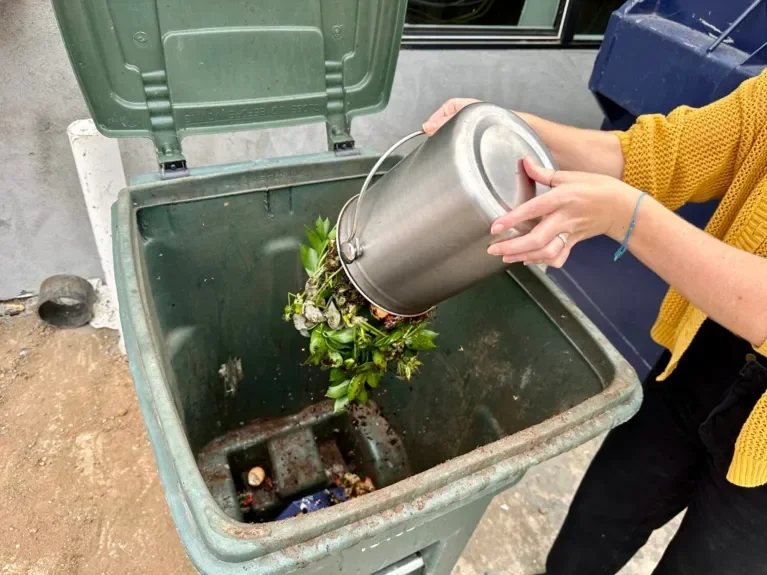Composting food waste helps reduce greenhouse gas emissions
Marin Independent Journal, Sept 8, 2025
The United Nations reports that food waste contributes to 8% to 10% of global greenhouse gas emissions. If it were its own country, it would be the third-largest contributor of greenhouse gas emissions.
This could be fixed by putting more food waste into compost bins. Any food that is not eaten must go somewhere. It’s either going in the green bin for compost or the trash bin for landfill. In the landfill, it decomposes under anaerobic conditions, producing methane and increasing landfill matter. In the green bin, it gets composted, a process that produces high-quality soil and has a significantly lower carbon footprint.
The choice is clear. Composting has a positive effect on the climate, reduces landfill waste and results in nutrient-rich soil.
When food waste is sent to the landfill, it degrades under anaerobic conditions and releases methane, a potent greenhouse gas. As food gets buried by garbage and other matter, it is sealed off from oxygen. Without oxygen to break the food down, the bacteria release methane as a byproduct.
In addition, food waste takes up unnecessary space. According to the U.S. Environmental Protection Agency, food waste accounts for over 24% of the solid waste in landfills. Instead of filling landfills with large quantities of food, it could be made into compost. Composting facilities keep food waste and plant matter in close contact with oxygen, so food waste doesn’t produce methane. In the composting process, food breaks down into nutrient-rich soil that farmers, landscapers, and homeowners can use.
Producing food takes energy and transporting it from farm to store, as well as from our homes to landfill or composting facilities also produces greenhouse gas. When it is thrown away or composted, all the energy and emissions put into it are wasted. The ultimate way to prevent unnecessary greenhouse gas is to only buy food you will eat, and eat all the food you buy.
According to the National Waste and Recycling Association, 72% of Americans do not compost, but 67% would prefer to if it were easier. Composting in Marin is remarkably easy. Companies like Zero Waste Marin and most Marin trash haulers hand out compost pails for free, so why not use that to our advantage and do our part to save our planet?
Some Marin municipalities recently added compost bins to their parks through the Painted Bins program. It puts bins decorated with children’s artwork in parks to encourage park visitors to compost. Locals love to have picnics, birthday parties or just a simple snack in the parks, which leads to a lot of food waste, especially when there are no compost bins.
As part of the Marin School of Environmental Leadership’s Food Waste Diversion Group, Maxine Bussi, a group member who contributed to this commentary, went to San Rafael’s Pickleweed and Terra Linda parks to collect data on composting. We found that out of the 86 people interviewed, 73 threw their food waste in the trash over the fall and spring semesters because there was no other option. The other 13 people took it home to compost or left it on the table. We also asked if it would be beneficial to have access to food waste receptacles at the park. Of the 86 surveyed, 84 stated that compost bins would be useful.
It’s easy to get started. Get a compost pail and collect your food scraps. Every week, dump it into the green curbside bin. This will ensure that your food scraps end up in the compost. This will not only reduce the waste that goes to the landfill, but it will also improve overall soil health, conserve resources, and minimize the amount of greenhouse gases that get released into the atmosphere.
Composting can be huge in the fight against climate change. When you compost, you limit the amount of methane released into the environment. Remember that every crumb counts in this fight. Do your part and be food smart.
Brendan Fells and Kenta Levijarvi are students in the Marin School of Environmental Leadership at Terra Linda High in San Rafael. They were joined by Maxine Bussi, a fellow member of the Food Waste Diversion Group.


